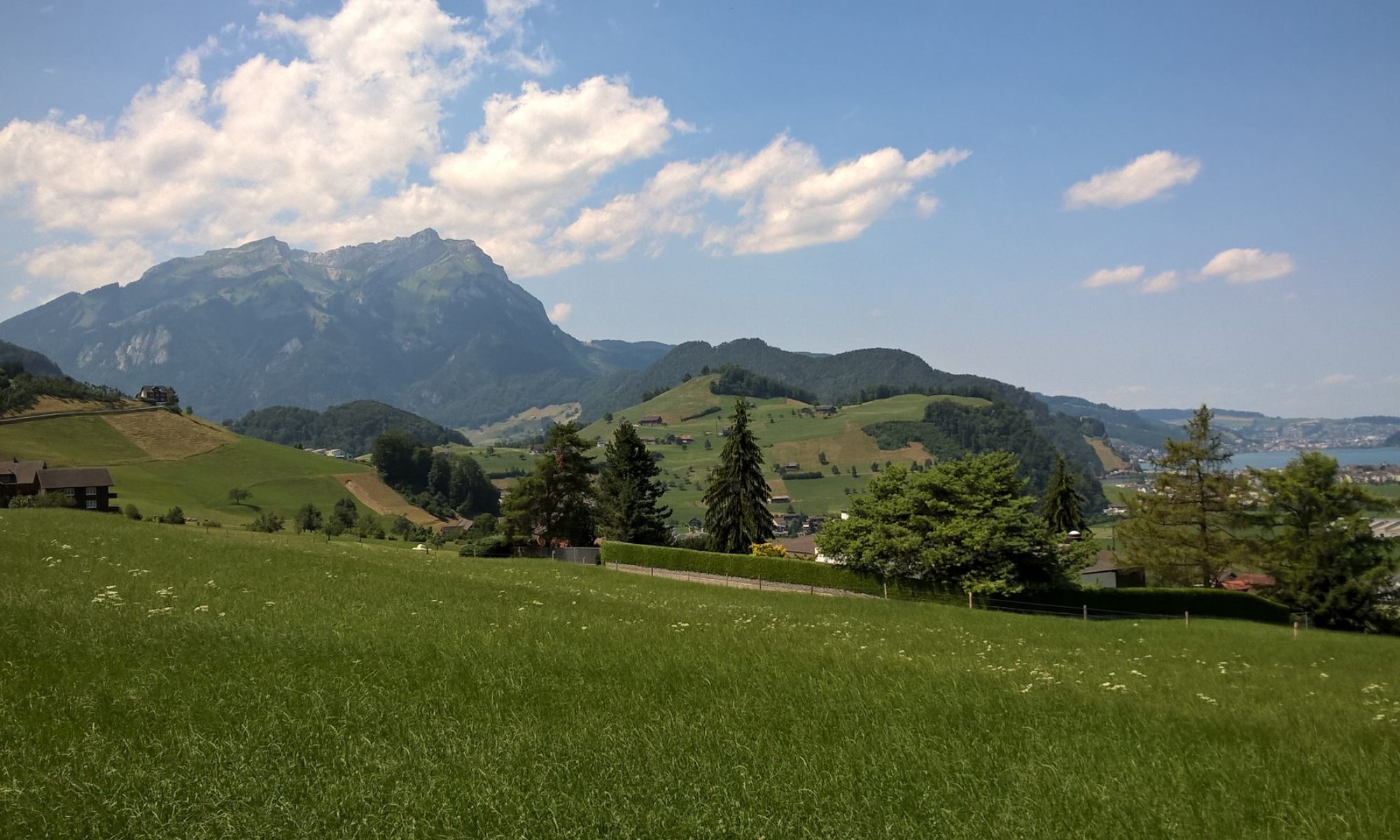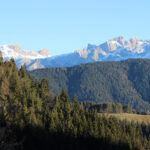Switzerland is a fantastic place to undertake a high school exchange. I know, because I did one there myself, in Lucerne, in 1996.
Although more than twenty years have passed since then, all the things that made Switzerland an ideal exchange destination in 1996 are still there today. Switzerland is still a wonderfully scenic country. The country is still safe, clean, efficient and well organised. Swiss people are still rational and sensible, but good-humoured and generous. (In fact, my Swiss host families contained some of the kindest and most caring people I’ve ever met).
If you are considering going on exchange, it’s hard to think of a better place to go than Switzerland.
Here’s everything you need to know if you’re planning to do a student exchange in Switzerland
One country, four languages
Switzerland has four official languages:
- French – which is spoken in the Western third of the country
- Italian – which is spoken in the southernmost canton (state), Ticino
- Rhaeto-Romanic dialect – which is spoken by limited numbers of people in the canton Graubuenden, and
- German – which is spoken in the rest of Switzerland
The majority of exchange students in Switzerland are hosted in cantons where either German or French is spoken.
French
If you’ve been learning French at school, there’s good news: the French spoken in Switzerland is very similar to the French spoken in France and which you’ve been learning in the classroom.
Some vocabulary is different – for example, the Swiss French word for eighty is huitante rather than the French word quatre-vingt. But you’ll quickly recognise words and phrases from your prior study.
German
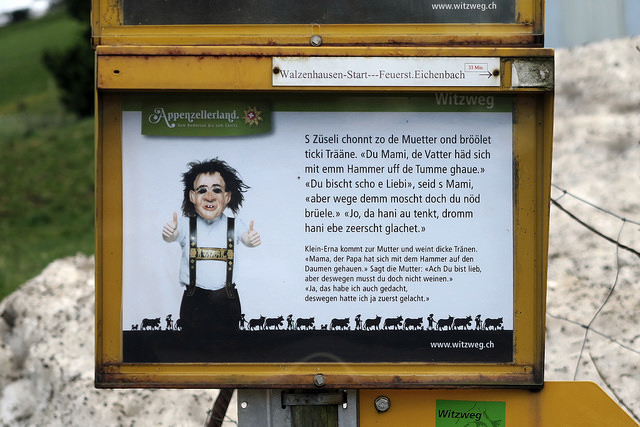
If you’ve been learning German at school, there is mixed news: the situation in German-speaking cantons of Switzerland is more complex.
The mother tongue of Swiss living in these cantons is Swiss German, which is radically different from the German spoken in Germany and Austria (so-called “High German”). In fact, Germans and Austrians usually can’t understand Swiss German at all. Imagine the thickest Scottish brogue you’ve ever heard, double it, and you’ll be getting close to the way Swiss German sounds to speakers of High German.
As an exchange student in a German-speaking canton of Switzerland, you’ll be hearing Swiss German about 70% of the time. Your school lessons should be taught in High German, and news broadcasts are always in High German, but Swiss people talk to each other in Swiss German. When your host families and school friends speak to each other, and when they talk to strangers, they’ll speak Swiss German.
The fact that Swiss people converse in Swiss German, rather than High German, will make it more difficult for you to learn High German. That’s one of the very few drawbacks of undertaking an exchange in Switzerland.
High school in Switzerland
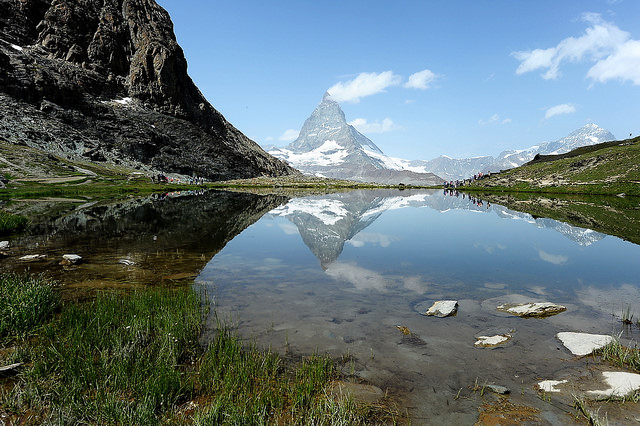
As an exchange student, you’ll attend a Swiss high school. Each of the 26 cantons in Switzerland has its own education system and there are subtle differences between all of those systems.
However, one common thread is that most cantons have streamed high schools – meaning that students go to different high schools depending upon whether they intend to study at university, or not. It’s most likely that you’ll attend high school attended by students who are bound for university – which are known as Gymnasiums or Kantonsschulen in the German-speaking parts of Switzerland, and lycees or colleges in French-speaking cantons.
Subject choice
High school students in Switzerland study a wide range of compulsory subjects. Even in the final two years of school, it’s normal to study 12 or 13 subjects, which can include multiple languages (including English and Latin), philosophy and multiple science subjects. Teachers teach to a high standard, and have high expectations of students.
As an exchange student, you may have some latitude to sit out some of these subjects, or to attend twice as many classes in particular subjects. If you’re particularly interested in art or music, for example, but haven’t studied philosophy before, you may be able to pick up an extra line of art or music while the rest of your class takes philosophy class.
Attire
Most schools in Switzerland don’t require their students to wear a uniform.
One interesting thing I noted was that most students tended to wear the same thing all week – they’d change their t-shirt but keep wearing the same jeans and sweater from Monday to Friday. So, don’t fret about the need to bring dozens of different outfits to wear to school – four or five sets of jeans and sweaters should be fine.
Extra-curricular activities
Swiss schools offer very few clubs, sports or other co-curricular activities. Instead, most people pursue such interests through local clubs which are known as Vereine in German. There are a large number of Vereine in most areas, offering everything from cycling to pistol shooting to choir singing, so it should be easy for your host family to help you find a Verein to suit your interests.
Social etiquette
There is a bit of a social divide in Switzerland. In general, residents of the German-speaking cantons are more socially conservative, and people in the French-speaking cantons are more liberal.
However, there are a number of common social norms and etiquette that you need to be aware of, as follows:
- Swiss people are proud to be Swiss and are protective of their culture and national identity. Take care to avoid criticising habits or things about the country you don’t like.
- The Swiss are extremely punctual. It is considered rude to be late and especially rude to make other people late (for example, when you and your host family are invited to dinner at another family’s house, and you take so much time getting ready that you delay your host family’s departure and make them arrive late).
- Don’t swear – particularly around your host parents, teachers, and other authority figures. People on exchange in the German speaking parts of Switzerland need to be wary of the word Scheisse. It’s milder than the equivalent English word – in fact, it’s probably closer to crap – and is used more often in daily conversation by native German speakers. However, it is still too impolite to use in front of your host parents or other authority figures.
- Also, Swiss people are relatively devout, so avoid exclamations like “God!” or “Jesus!”, and avoid being flippant about religion or religious people.
- In the German-speaking cantons of Switzerland, it’s considered polite to greet people with their names, if you know them. If you see your friend Urs in the street, for example, you need to say “Hoi Urs” (“Hi Urs”), rather than just saying “Hoi”. Some exchange students go for an entire year without realising this, but it’s enough to cause offence.
- The three main languages in Switzerland – German, French and Italian – all have formal and informal ways of addressing other people. Make sure that you always use the formal when you’re addressing others, unless they are children, members of your immediate host family or schoolmates. Using informal language to address others, such as teachers, shop assistants or adult friends of your host family, can cause real offence.
Money management
Switzerland is famous for its banking sector, and Swiss retail banks are modern and well-organised. Your host parents or exchange organisation will organise a bank account for you.
ATMs are widespread throughout Switzerland, and all major banks offer internet banking. Most Swiss banks also offer accounts which have a Maestro card linked to them. Maestro – owned by MasterCard – is a payment method which works like a credit card, but allows you to use funds from your savings account to pay for purchases, rather than bank credit.
Cost of living in Switzerland
Switzerland is an expensive country in which to live. The cost of living in Switzerland is on par with Japan, Scandinavia and Australia, and is considerably more expensive than the cost of living in the remainder of Europe, North America and South Africa.
When you factor in exchange rates, Switzerland is a hugely expensive place to live.
Thankfully, your host family will help you meet most of your food expenses, and your exchange organisation may help you to meet some of your costs of living. For example, my sponsoring Rotary club in Switzerland used to pay for my monthly bus and train pass.
When you’re out and about, some basic foodstuffs are relatively cheap – such as milk, bread, cheese and chocolate. The two biggest supermarket chains in Switzerland – Migros and Coop – are a good place to grab lunch or a snack at a reasonable price.
Migros and Coop are also probably the best places to buy essentials like shampoo, toothpaste and deodorant. German discount supermarkets Aldi and Lidl have also recently opened in Switzerland, and are a good option for buying your food and toiletries.
What to bring
For some reason, name-brand clothing like Nike or Levis can be very hard to find in Switzerland. When you do find it, the eye-watering prices can put it out of your price-range, anyway. Likewise, cold-weather gear (such as long coats and thermal longs) can be expensive. Stock up on such items before you leave home, or be prepared to give your Amazon account a good workout.
Having said that, there is a mid-priced department store chain in Switzerland called Manor which is a great place to shop for (non-brand name) clothing. Manor sells its own brands and these are generally stylish, last very well, and (by Swiss standards) are reasonably priced. My wife has a pair of winter gloves and some socks which she bought at Manor in Lucerne in 2009, all of which are still going strong after years of wear.
Electronics (iPods, phones, cameras) are generally expensive in Switzerland. Again, you’re better off bringing your own electronic gear rather than planning to buy in Switzerland.
Getting around
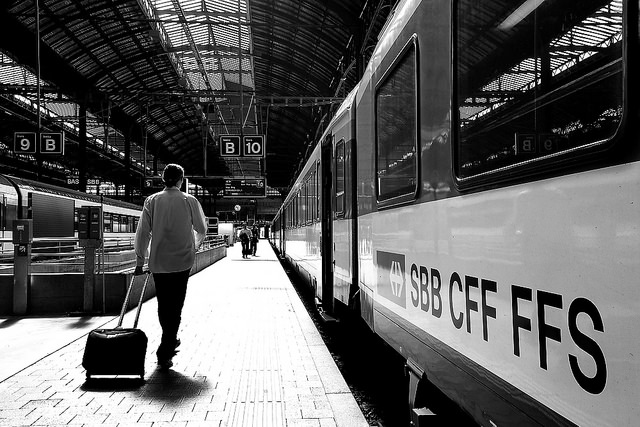
Most exchange students in Switzerland – like most Swiss people – travel using a combination of train and velo (bike).
The Swiss train system is legendary for being fast, clean, efficient, and punctual. Be warned – it is really punctual. If your train leaves at 11.02am, it will leave at 11.02am on the dot and not a second later. You need to be on board. The train network is extensive and will take you to nearly every corner of the country.
For the trip to school or other local journeys, your Swiss host family will probably provide you with a bike. Switzerland has a well-developed network of bike paths and secondary roads which make cycling quite safe and enjoyable. Although Switzerland has a relatively low crime rate, you need to lock your bike up at school and at the train station when you aren’t using it.
Swiss food
Swiss cuisine is delicious and readily palatable for people with Western tastes. As in many other European countries, lunch is the main meal of the day for Swiss people.
Main meals consist of foods such as pasta, schnitzels, pastries, potato dishes (including the noted national specialty, Roesti), and salads. Although Switzerland is most famous for its chocolate and cheese, the fresh bread and yogurt are just as addictive. You have been warned!
Swiss culture
Sport
The Swiss participate in a wide variety of sports. In summer, cycling, swimming and tennis are very popular. Cycling in particular is an ideal sport for exchange students: it’s free, a great way to see Switzerland, and Switzerland has a huge network of safe, well-maintained and signposted bike paths.
In winter, nearly everyone in Switzerland heads to the alps for skiing and snowboarding. Nowhere in Switzerland is more than a couple of hours from a skiing area, and nearly every exchange student ends up going to the snow with his or her host family for at least a couple of days. If you do end up doing snow sports, your host family will be almost certain to have ski or snowboard gear which you can borrow, so there is no need to worry about bringing any of this from home.
Music
Young Swiss people listen to the same kinds of music as audiences in most western nations. Basically, it’s a mix of pop, rock, R’n’B and hip-hop. Most of the songs which are popular in the US and UK will also make it to the radio in Switzerland. Swiss radio also plays German-language songs from Germany and Austria, and French-language music from France.
I found the live music scene to be a little under-developed when I lived in Switzerland. Hopefully, things have improved in the meantime.
Communications
Internet
Switzerland generally has outstanding internet infrastructure. It’s virtually certain that your host family or families will have a good, fast connection that you can use.
Mobile telephones
Switzerland also has excellent cell phone options – numerous providers offering full geographic coverage at low prices. Your host family should be able to help you get connected within your first couple of days in Switzerland.
Climate
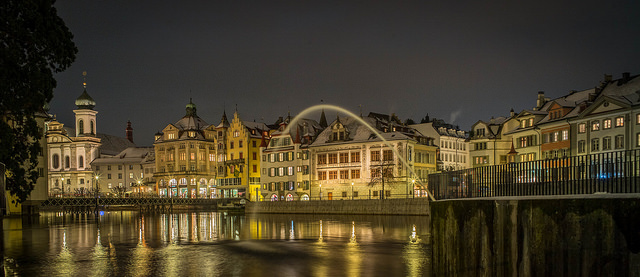
Switzerland’s climate is similar to the Northeastern United States. Summers can be surprisingly hot and, due to the large number of lakes and rivers in the country, very humid.
Winter is relatively cold – with daytime temperatures close to zero for months on end – but with a small diurnal range. Nighttime temperatures in the Swiss winter are usually nowhere near as cold as, say, Canada or Scandinavia.
Something that takes some getting used to is a wintertime phenomenon called Hochnebel – basically, a layer of cloud which sits 7-800 metres above sea level and which persists for weeks and weeks on end without interruption. You can easily go for a month or more in Winter without seeing the sun.
Risks and hazards
Overall, Switzerland is a very safe country. Crime rates are extremely low – even by European standards – and there are relatively few natural hazards which you need to be wary of.
Even so, you need to exercise prudence and caution as you would in any other country. In particular:
- Don’t hitchhike or walk alone by yourself by the side of the road at night time.
- When heading out at night – and particularly when waiting at train stations – try to ensure that you’re with at least one other person at all times.
- If you are going to be drinking alcohol – particularly larger amounts – make sure that you have a friend with you and a way of contacting your host parents if you get into trouble.
- When riding your bike after dark – be it coming home from school in Winter, or travelling home from a party late at night – make sure to use a light, and keep off the road if possible.
If you have any questions about going on exchange to Switzerland, please leave them in the comments below. And if you’re planning to go to Switzerland as an exchange student, my book How to Have a Successful High School Exchange contains lessons and advice from my own time in Switzerland which will help to ensure that your exchange is a success.
Good luck,
Matt
